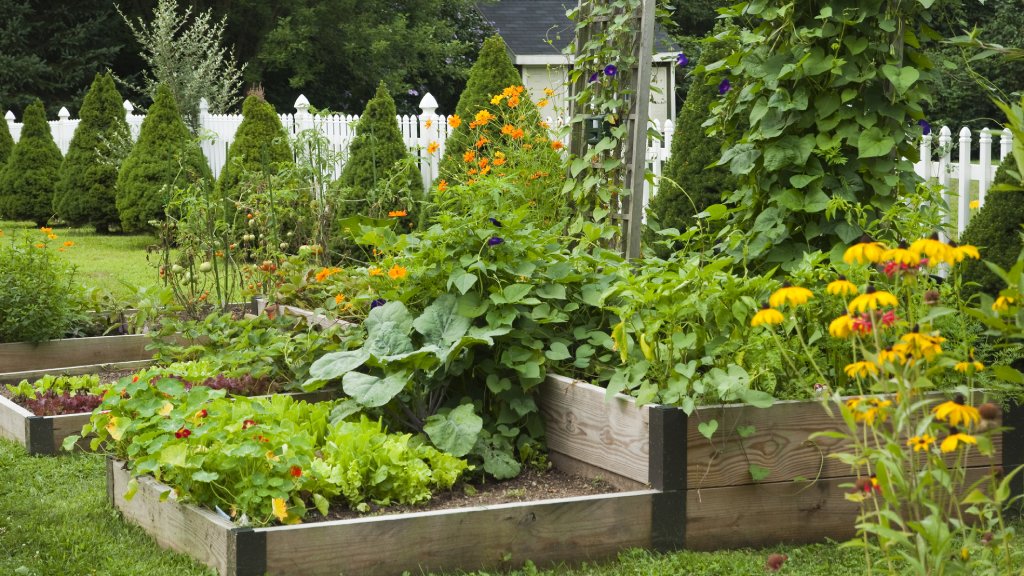Grow A Beautiful Vegetable Garden That’s A Feast For The Eyes
In addition to being practical and useful, growing beautiful vegetable gardens that are stunning and aesthetically pleasing can enhance your garden space.


Sign up for the Gardening Know How newsletter today and receive a free copy of our e-book "How to Grow Delicious Tomatoes".
You are now subscribed
Your newsletter sign-up was successful
A beautiful vegetable garden is just as useful as a utilitarian bed, so why not grow veggies with aesthetics in mind? A vegetable garden is inherently practical and most people start a veggie patch to grow food to eat. This doesn’t mean it can’t be attractive and ornamental too. Here are some pretty vegetable garden ideas.
How to Grow a Beautiful Vegetable Garden
A vegetable garden should be practical, so start there. Choose an area that has good soil and plenty of sunlight. Select vegetables that will grow well in your local environment and that you will eat and enjoy. Then, start to think about how it could also be a decorative vegetable garden:
- Are there certain varieties of vegetables that are more attractive?
- Can you design the bed with a particular shape or with symmetry in mind?
- Does it make sense to add flowers to the vegetable bed to make it more appealing?
- How can you add stones and other decorative elements to make the area prettier?
Get creative to create beautiful veggie gardens. Come up with unique ideas to make your vegetable bed as pretty as it is useful.
Pretty Vegetable Garden Ideas
You can find plenty of beautiful vegetable garden designs online to make your dream a reality. Here are six ideas to get you started:
1. Create a Geometric Bed
A simple rectangle or square is easier, but more intricate garden shapes create visual interest. Look to the past, when stately homes and palaces used decorative vegetable beds to supply the kitchen. Interesting shapes include hexagons and stars.
2. Edge Your Beds
Neat garden edges make any type of bed look more attractive. The most basic option is to use an edger to clearly define a boundary between the bed and a lawn. To make your veggie garden even prettier, use stones, bricks, or plants to decorate the edge. A flower border is a nice way to beautify a vegetable bed.
3. Use Pretty Support Structures
Many vegetables benefit from support, including peas and beans, summer squashes and cucumbers, tomatoes and others. You could just stake plants or let them trail along the ground, or you could add something more attractive. Use a decorative trellis or arbor, for instance.
Sign up for the Gardening Know How newsletter today and receive a free copy of our e-book "How to Grow Delicious Tomatoes".
4. Choose Attractive Varieties
It’s easier than ever to find unique varieties and cultivars of all kinds of plants, including vegetables. Instead of growing green lettuce, why not find a purple heirloom variety. Add a rainbow of multicolored chard instead of regular greens. Grow purple cauliflower, colorful heirloom tomatoes, and unique squashes to enjoy a variety of vegetables in the kitchen while also beautifying your beds.
5. Include Ornamentals
There is no rule that says everything in a veggie bed has to be a vegetable. Mix it up and incorporate some of your favorite annual or perennial flowers in between rows or plants. You can even grow vegetables around larger plants, like trees and shrubs. A mix of different colors, textures, and sizes of plants add visual interest in summer and throughout the year.
6. Use Containers
Create more visual interest and add color and texture to your vegetable bed by growing some plants in containers. You can partially sink the containers into the soil or leave them above ground to show them off fully. Containers also make it easier to keep beds neat and tidy. They allow you to rearrange plants as needed to change the look of the garden.
Let your creativity soar by mixing ornamental plants with your edibles. Not that vegetable gardens aren’t inherently lovely, but dressing them up with pretty plants, shapes, edgings and supports to make them magazine worthy.

Mary Ellen Ellis has been gardening for over 20 years. With degrees in Chemistry and Biology, Mary Ellen's specialties are flowers, native plants, and herbs.